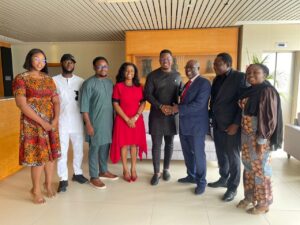
The Manufacturers Association of Nigeria (MAN) has made a passionate appeal to the federal government on the need to intervene, over the issue of multiple taxation, confronting its members, stating that an average manufacturer , operating in the country, contends with not less than 30 different forms of taxes, fees, and levies, annually.
The association’s President, Otunba Francis Meshioye, disclosed this at this year’s edition of the Adeola Odutola Lecture Series, for the association’s 51st Annual General Meeting (AGM), held in Lagos.
According to him, such multiple taxation and levies are beginning to take their tolls on the sector, resulting in the rising cost-of-doing business and rapid divestment in the manufacturing sector.
He added that the combination of those issues have continued to depress demand, worsen job losses and increase the incidence of poverty and low revenue generation from the sector.
The MAN boss, however, expressed the association’s confidence in the ability of the newly-constituted Presidential Committee on Fiscal Policy and Tax Reform to adequately address the matter, since there are quality representations of the Organised Private Sector (OPS) on the committee.
“Our Director General represents the Organized Private Sector on the Committee and we look forward to working jointly with the representatives of your Ministry on the Committee to make the case for fair taxation of the manufacturing sector,” he stated.
He explained that the theme of this year’s AGM, “Setting the Agenda for Competitive Manufacturing under the AfCFTA: What Nigeria Needs to Do”, was informed by the need to address the sector’s successive low performances over the years.
Otunba Meshioye explained further that it was also to look at the promising growth trajectory and development opportunities, embedded in the African Continental Free Trade Agreement (AfCFTA) for the Nigerian manufacturing.
“It has become a matter of necessity and urgency to deepen our awareness of the imperative of the AfCFTA; we need to develop the right strategies and concerted efforts to position our economy as the number one manufacturing hub of the African economy”, he added.
In his Keynote Address, former Minister in the Ministries of Industry, Trade and Investment; and Finance, Olusegun Aganga, warned that unless Nigerians imbibe the culture of patronising locally-made goods, the country might be turned into a dumping site for cheap and substandard goods, when the (AfCFTA), fully takes off.
He stated that though the AfCFTA provides the opportunity for the nation’s manufacturers to access the over 1.5billion market of 54 African countries, it must, however, put its house in order to leverage such opportunities.
According to him, Nigeria’s huge market remains the main attraction to the whole world, including African countries that had signed the AfCFTA, and, if well managed, will go a long way in boosting the nation’s economy.
“But, Nigeria must work towards consuming what it produces and producing what Nigerians consume. Otherwise, with the AfCFTA in place, Nigeria will be flooded by cheaper and substandard goods.
“We must not deceive ourselves. Nigeria is the target market for the other African countries. Nigeria has a relatively and potentially huge internal market, given its estimated population of about 217 million people, and access to the rest of ECOWAS,” he added.







Comments